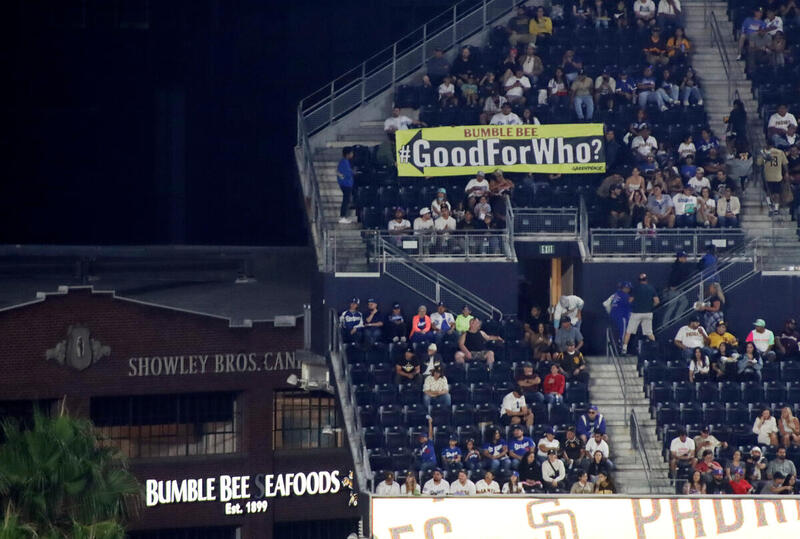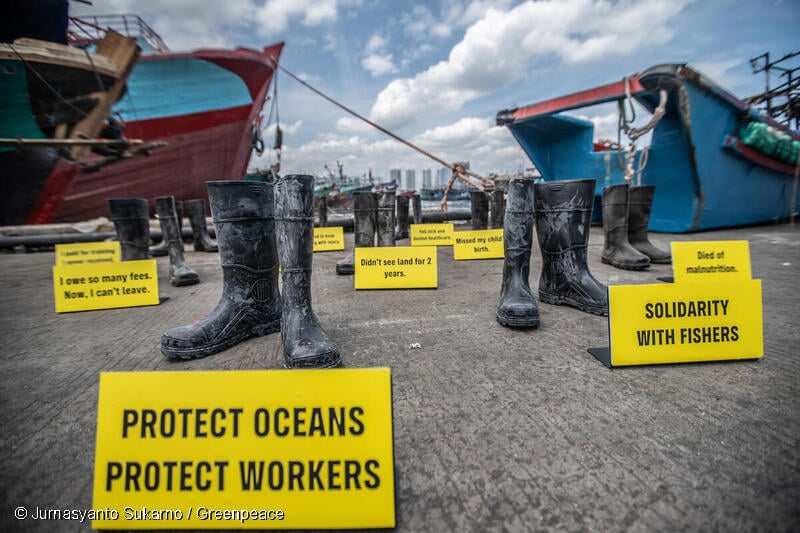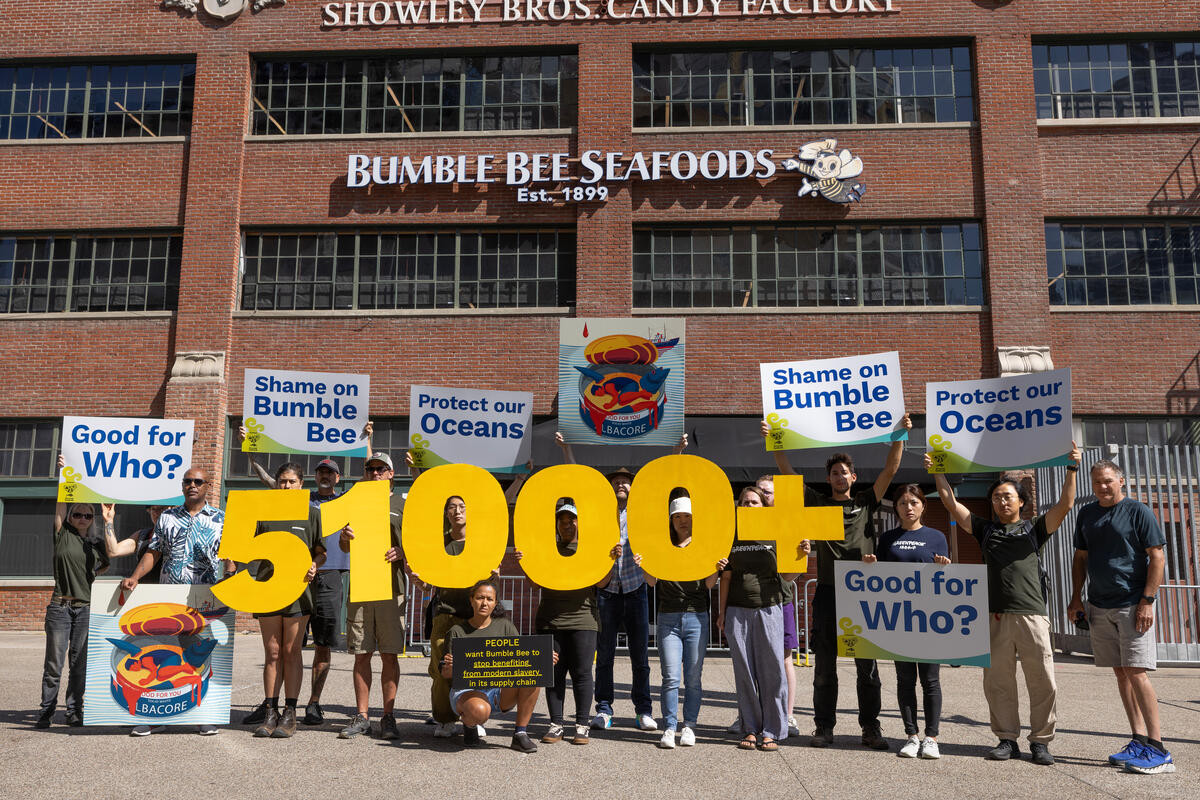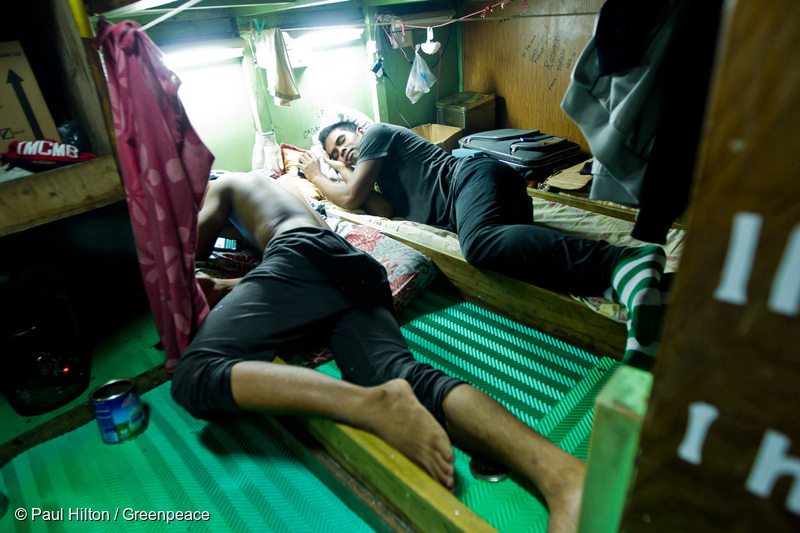Greenpeace USA Call out Company’s Human Rights and Environmental Record
Yesterday, Greenpeace USA activists unfurled a banner during a Padres home game at Petco Park Stadium in San Diego pointing to Bumble Bee’s headquarters that reads “Bumble Bee: #GoodforWho?” They called on Bumble Bee to end the suspected human rights abuse and illegal fishing in its supply chain.

Greenpeace USA Call out Company’s Human Rights and Environmental Record
Yesterday, Greenpeace USA activists unfurled a banner during a Padres home game at Petco Park Stadium in San Diego pointing to Bumble Bee’s headquarters that reads “Bumble Bee: #GoodforWho?” They called on Bumble Bee to end the suspected human rights abuse and illegal fishing in its supply chain.

Washington, DC (September 30, 2022) – Yesterday, Greenpeace USA activists unfurled a banner during a Padres home game at Petco Park Stadium in San Diego pointing to Bumble Bee’s headquarters that reads “Bumble Bee: #GoodforWho?” They called on Bumble Bee to end the suspected human rights abuse and illegal fishing in its supply chain.
The action came just days after Taiwan, where Bumble Bee gets much of its tuna, was again included on the U.S. Department of Labor (DOL)’s List of Goods Produced by Child Labor or Forced Labor.
Mallika Talwar, a Senior Oceans Campaigner at Greenpeace USA who participated in the action, said: “We’ve had enough of Bumble Bee’s tainted tuna and their claims that it’s “Good For You.” At least some of their products have been sourced from a vessel whose crew was indicted for their involvement in forced labor and human trafficking and harvested by fishers who report physical abuse, shark finning, and illegal fishing. That isn’t good for anyone — not the vulnerable fishers who face harm or death, nor Americans who expect companies like Bumble Bee to act responsibly, and certainly not for our oceans and our planet.”
Bumble Bee positions itself as “champions for sustainable fishing and dedicated advocates for fishers,” but a recent investigative report from Greenpeace East Asia finds otherwise. Fake My Catch – the unreliable traceability in our tuna cans found that over 10% (13) of the 119 sampled Taiwanese-flagged/owned vessels that supplied Bumble Bee had previously violated Taiwan Fishery Agency (TFA) regulations and were on their Illegal, Unreported, and Unregulated (IUU) list. The report also found that some vessels supplying Bumble Bee had reportedly engaged in shark finning and illegal fishing.
Particularly alarming was the discovery of a canned Bumble Bee product at a Harris Teeter grocery store, in Arlington, Virginia, which contained fish sourced from the Da Wang — a vessel that was recently confirmed by US Customs & Border Protection to have employed forced labor, prompting questions about how many other such possibly tainted products are on US supermarket shelves.
Several fishers who worked aboard the vessels supplying Bumble Bee reported working excessive overtime hours while having their wages withheld. Others stated that their documents were retained, a forced labor practice sometimes used by vessel operators or manning agencies to deter or prevent fishers from leaving or terminating their contracts early.
Talwar continued: “Bumble Bee, as one of the leading companies in the canned tuna market, has the power to impact the health of our oceans and the lives of fishers at sea. But for years they have failed to take the full measure of their responsibility. We’re calling on them to take more comprehensive and urgent action now to clean up their supply chain, protect the rights of workers, and safeguard our oceans.”
Greenpeace East Asia and the US office’s research included collecting hundreds of tuna cans from US supermarkets and entering 73 distinct codes into the Bumble Bee’s “Trace My Catch” (TMC) system, which allows consumers to track the source of its tuna products.[1] The data gathered was then cross-checked with the TFA and Global Fishing Watch, an open-access tool that analyzes global fishing activity. The researchers found that the information shared on Bumble Bee’s site is sometimes incorrect and insufficient for informing consumers about the notoriously opaque seafood supply chain.
Talwar continued: “Consumers today want to know and trust where their seafood comes from. Bumble Bee says they support transparency that helps us make sustainable choices. But sharing incorrect and incomplete information is not what real transparency looks like. Bumble Bee should stop hiding behind smokescreens like their “Trace My Catch” system and do the right thing by providing consumers with information that is comprehensive, correct, and readily available and by taking action to actually address environmental and human rights abuses in their supply chains.”
Greenpeace USA and Greenpeace East Asia have called on Bumble Bee and its Taiwanese parent company, Fong Chun Formosa (FCF), which have previously been linked to these issues in their supply chain, to issue an apology to the exploited fishers; remove products tainted with suspected IUU fishing and forced labor from the market; fully disclose their supplying vessels list; and establish an independent investigation committee for the flaws in Trace My Catch.
###
Photo and videos of the action in San Diego are available here.
Notes
[1] The codes were taken from Bumble Bee cans sold in Arlington, Virginia; Washington, DC; Durham, North Carolina; Chicago, Illinois; and Columbia, Maryland.
Greenpeace USA is part of a global network of independent campaigning organizations that use peaceful protest and creative communication to expose global environmental problems and promote solutions that are essential to a green and peaceful future. Greenpeace USA is committed to transforming the country’s unjust social, environmental, and economic systems from the ground up to address the climate crisis, advance racial justice, and build an economy that puts people first. Learn more at www.greenpeace.org/usa.



